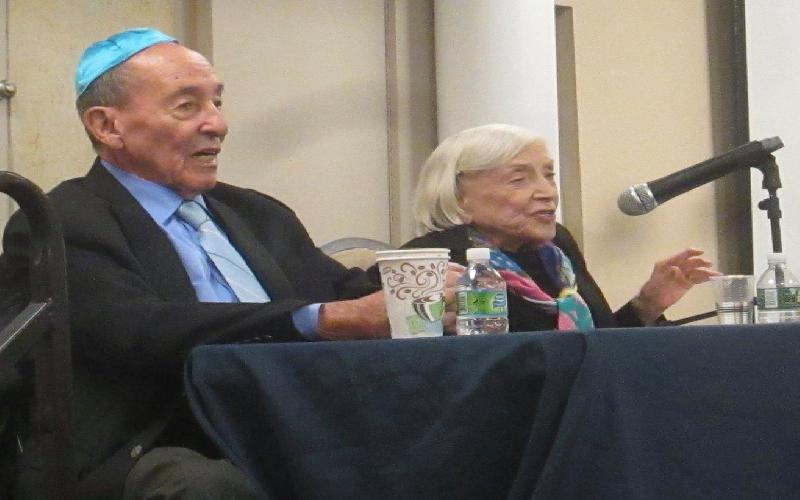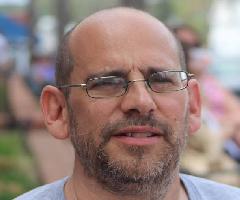Unfortunately, there are no shortage of Holocaust stories. On the other hand, the inspiration we draw from stories of survival doesn’t run out either. But Rabbi Arik Wolf drew a distinction beyond the determination so many displayed in introducing Wednesday night’s guest speaker at Chabad of Bedford Hills.
“It’s more amazing to hear of somebody who didn’t just survive but put their lives at risk so that others might,” Rabbi Wolf said of Marthe (Huffnung) Cohn.
Her journey began with German occupation, but being French born provided some cover. “Foreigners always are the first to suffer,” she said. “So they were the
first Jews arrested.”Unfortunately, her sister’s association with the resistance did not make her immune. Stephanie Huffnung was part of network that got Jews out of occupied France. “She wrote a letter to one of the operatives and signed her own name,” said Cohn.
This alerted the Germans, and they wanted names. “My sister refused, and they arrested my father to leverage her,” said Cohn.
Cohn’s family came up with an escape plan but Stephanie refused because her nursing background enabled her to give care to children in the camp.
Stephanie also realized the risk to her family . “If I escape you will all be arrested,” Cohn conveyed her sister’s words.
Her sacrifice was supreme. “She later died at Auschwitz,” said Cohn.
Still, it took more than Stephanie’s selflessness for the family to survive. Without papers there was no way out of France, and Cohn initially refused help a countryman who could provide fake IDs. “You risk the life of your entire family,” she told him.
The forger saw a greater risk, though. “If I don’t help you, I can’t live with myself,” he reasoned.
The entire Huffnung family had their ticket out. But Cohn was soon paying return fare and moved back to Paris to study nursing. “I had an ID so I could make a living,” she said.
France’s liberation in August 1944 enabled Cohn to carry on where her sister left off, and she joined the army. But At 4’11’’ with fair skin and blonde hair Cohn was not well received. “They took me as a bimbo,” said the 96 year old.
Having a surplus of nurses, they made her a social worker. She did not protest. “If the army says you’re a social worker, that means you’re a social worker,” said Cohn.
Cohn would use her ambiguous status to her advantage “No one told me what I was supposed to do so I decided I was going to the front,” she said.
Cohn began getting supplies to the soldiers and would eventually meet a French Colonel who offered an Intelligence position. She wondered what she was getting herself into but was coaxed by the officer’s charm. “It didn’t hurt that he was very good looking,” Cohn joked.
She landed a job interrogating German POWs. “We needed to know how the Nazis were going to retreat back into Germany,” she said. “I got that information. It was my first achievement.”
Cohn wasn’t done yet and 12 failed attempts to get back inside Germany didn’t deter. The war obviously going the allied way, Switzerland could also feel the wind blowing, and their switching allegiance provided the path. “That’s neutrality,” she said.
A long field on the border of Switzerland was the entry point. There she strategized with another officer on how to bypass two German sentinels.
Waiting out the long hours, the middle aged Colonel put her at ease by talking about his wife and children so she was
taken aback as his tone changed. “He told me that I might not live past this night so why don’t we have a good time,” the audience delighted as Cohn again brought levity to the seriousness.The then 24 year old let him know that this was not on her agenda. However, she wasn’t so assured as the time came to cross. “I was paralyzed by fear, but suddenly it clicked,” she remembered.
Once inside there were still obstacles but her most significant contribution occurred as she noticed that Germans always walked in groups. So she ingratiated herself to a gaggle.
Among them was a German NCO. He fainted one day, and she took care of him for a few weeks. Gaining his trust, he invited her to the Ziegfeld Line where the German’s were thought to be shoring up defenses for the Allied invasion. “It had been completely evacuated,” Cohn beamed.
The intelligence crucial, she still had to get the information to her superiors. “When I got back to the city, everyone was gone,” she said. “The American Army had rolled in.”
Nonetheless, she had no way to identify herself. So she got in front of a tank and raised the Victory sign a la Churchill. Everyone understood, and Cohn was taken to headquarters.
The intelligence had saved countless allied lives. “I was a very important VIP that night,” Cohn said.
As a result, the commander offered a heroes exit from the war but that wouldn’t do. “My mission ends the day of the armistice,” she told him.
Cohn did parlay the preeminence into a little special treatment, though. “I asked if I could have a bicycle because I was tired of walking,” she joked.
Such modesty left her long unnoticed - even to her family. “I didn’t look like a spy so I didn’t think anyone would believe me,” Cohn revealed.
She eventually put it down on paper in her 2006 novel, Behind enemy Lines. But if the room had any doubts a table full of medals from the French and US government filled in the blanks.
That left it to the audience to go on honoring the courage of those like her who refused to relent.





